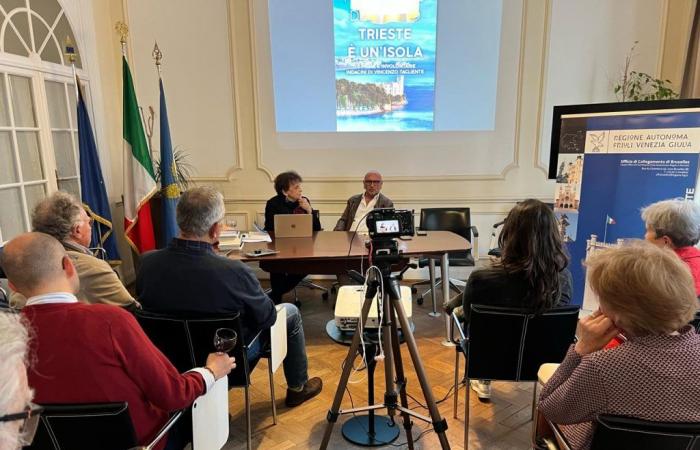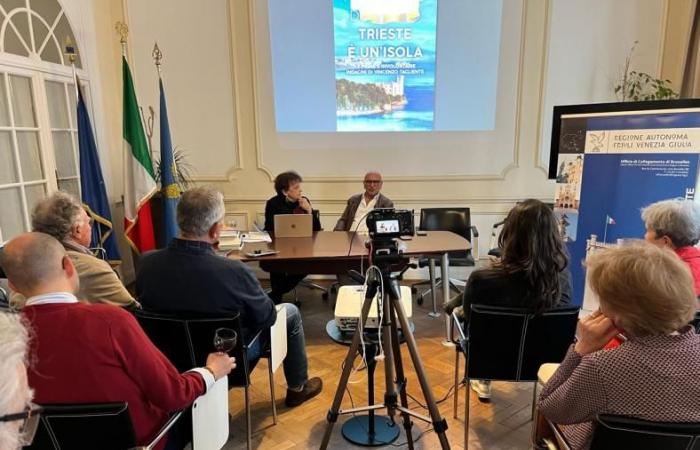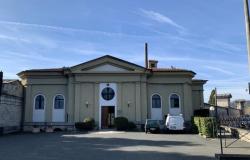(AGENPARL) – Rome, 16 June 2024
THE ART OF THE FRIULI VENEZIA GIULIA REGION IN BRUSSELS
Trieste, the wounded city is an island floating on the unsaid
De Filippo’s latest book presented in Brussels to the Fvg Region
Trieste, a city torn apart by conflicts and the troubled events of the eastern border in the twentieth century, according to the journalist and writer Francesco De Filippo, is an island (“Trieste is an island” is the title of his latest book, published by Castelvecchi) . An island of the mind, obviously not of geography: a unique place, which is recognized in specific codes, starting from the dialect, a language used universally by every social stratum, and traditions that almost take on the role of civil rituals, which serve to communicate a very strong identity, a shield that was formed after a long period marked by a sense of continuous threat of invasion.
This island also “floats” on the unsaid but not removed, on events from the past that remain relevant but almost never emerge in public discourse. These are some of the reflections that emerged during the presentation of the volume at the Liaison Office of the Friuli Venezia Giulia Region in Brussels, in which the author spoke with Marianna Accerboni, curator of the exhibition “Female Trieste art in the 20th century ”, which can be visited at the Italian Cultural Institute in Brussels until July 31st and during which the presentation of De Filippo’s spy story took place.
In short, for all these characteristics, a city, or rather, an island to be discovered, slowly revealed with the care dedicated to an ancient and precious object. A two-faced island: on one side fiercely attached to the past, on the other projected into the future with enlightened entrepreneurship and a very high number of cutting-edge scientific research institutions.
“I chose the detective style because it allowed me to accompany the reader in discovering not only the plot of the book but also the city itself,” specified De Filippo. Plot that takes the reader between Trieste, Naples – the city of origin of the writer and his main character, Vincenzo Tagliente, of whom we read “the first and involuntary investigations” – and the United States of America.
But it all starts from the Padriciano refugee camp, a few kilometers from the center of the Julian capital, where thousands of Istrian-Dalmatian exiles have passed through. The book tells how the chain of violence and injustices carried out by totalitarian regimes have had repercussions on ordinary people.
But it does so by “mixing the smile with drama as in the best Neapolitan tradition”, as subtly recalled by Accerboni who, introducing the author, underlined the interweaving of the pathos of the detective story with the tragedy of epochal historical events such as the exodus of 350,000 Istrians and the foibe – which marked the city in the difficult post-war period. Plus other “moments of divertissement of almost theatrical inspiration as in Neapolitan culture, to which the author belongs”.
Present at the meeting were Italian, Belgian and French intellectuals and artists as well as Enrico Tibuzzi, head of the Belgian branch of the Ansa Agency, and Italo Rubino, vice-president of the Brussels Circle of the Giuliani nel Mondo Association.
Additional information about the author
Francesco de Filippo (Naples, 1960), was sent abroad for Il Sole 24 Ore and is responsible for the Ansa Agency for Friuli Venezia. He is the author of over twenty books, including novels, essays and others, several of which have been translated in France, Germany and the Czech Republic. His debut novel, A Story Also of Love (Rizzoli, 2001), won the Cypraea prize, he entered the top five for the Berto Prize and was a finalist for the Arezzo Prize. The following, L’affondo di gommoni (Mondadori, 2004), was published in the Czech Republic and in France, where it was selected for the Supercampiello Europa and for the prestigious Polar prize. In 2001 he won the Paris Noir Prize with the novel L’Offense (Métailié). Numerous stories by him have been published in newspapers and periodicals (la Repubblica, Carta, Il manifesto) and appear in various anthologies. Among his latest works are Philosophy for the Next Humans (with Maria Frega – Giunti, 2020), and for Castelvecchi The New Silk Road (2019), No vax: the great denied dream (2022) and the novels The Visions of Johanna (2019 ), First we exterminated the birds… (2020).
Additional information on the exhibition
The exhibition project is promoted and supported by the Autonomous Region of Friuli Venezia Giulia and the Foemina APS Association of Trieste and created in co-production with the Italian Cultural Institute of Brussels, with the patronage of the Municipality of Trieste, media partner Il Piccolo, Trieste’s newspaper, and with the organization of Associazione Giuliani nel Mondo and Circolo AGM of Brussels, Ente Friuli nel Mondo and Fogolâr Furlan of Brussels and the contribution of Fondazione CRTrieste, Ciaccio Arte – Big Broker Insurance Group (Milan), Francesco Katalan casa di expedition Srl (Muggia, Trieste), Zidarich Agricultural Company (Trieste), Rotary Club Trieste Alto Adriatico, Biesse Electrical Supplies Studio Luce, Videoest Trieste, Grafica Goriziana.






